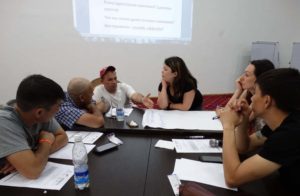
Author: Olga Ochneva, Kyrgyzstan
Community organizations are often not cooperative: each one deals with specific problems and has its own approaches to work. Nevertheless, the Coalition of Four Communities: people who use drugs (PUD), sex-workers (SW), people living with HIV (PLHIV), lesbians, gays, bisexuals and transgender people (LGBT) is developing and gaining strength in Kyrgyzstan. Consolidation began three years ago without any financial support. The goal is to make the participation of communities in solving the problems of their groups meaningful, to fight against HIV, to reduce stigma and discrimination. Below we discussed the experience of interaction, successes and plans with the representatives of the Coalition.
Four years ago, our interlocutors could not even dream of uniting all groups vulnerable to HIV.
“I said three years ago, that organisations for people who use drugs can only unite with a group of PLHIV, and probably with sex-workers organisation. The representatives of our group often have experience of imprisonment and would never join the LGBT community,” says Sergey Bessonov, leader of the IDU community organization Harm Reduction Network Association. “At the meeting earlier this year, 99% of my employees agreed to work with convicted men who have sex with men. This is the result of the gradual and systematic work on the consolidation of our groups, which we have been carrying out in recent years. People start looking at each other differently.”
The true spirit of unity
The groups began to unite in 2015, when women who use drugs (Asteria), sex-workers (Tais Plus) and the LGBT community (Labrys) took part in presenting an alternative report on the situation with all three groups at the 60th session of the CEDAW Committee on the Elimination of Discrimination against Women in Geneva. According to the members of the Coalition, they sensed the real spirit of unity during the election of a representative from the community to the governmental Coordinating Council for Public Health.
“As community organizations, we have mobilized to promote our candidate as an alternative to a candidate from AIDS-service organizations, since we have different approaches to work. Spontaneously, within two hours we managed to organize 47% of the votes,” recalls the director of the organization for women who use drugs Irena Ermolaeva. “Then the community of PLHIV and men who used drugs joined us. Although our candidate did not win, we understood that we are stronger standing together than alone, understood the real power of consolidation and were inspired by it.”
Similar problems in groups
The first activity of the Coalition was the development and submission of two project applications. At this time, a large regional network announced grants for the development of consortiums of communities. According to the representatives of the Coalition, the focus of their applications was on maintaining tolerance among groups as the basis for the future work. The Coalition has not received support but did not stop a joint activity. In 2017, the Coalition together with the Office of the Ombudsman conducted monitoring: they monitored the rights of all four communities. Later the organizations united to conduct a media campaign to eradicate hate speech and a language of hatred.
“Initially, the campaign had to be focused on the LGBT community. At the joint meeting last summer we decided to include all our communities in the campaign,” says Nazik Abylgazieva, the LGBT representative of the Labrys organization. “We made a video with famous people of the country who spoke about our problems. Our message has been heard: during three days, the video was viewed by more than 150 thousand people.”
50 representatives of different communities took part in a joint training, recalls the psychologist of the PLHIV-organization Prosvet Margarita Sabirova, and the team-building process was seen. People overcame external and internal discrimination. It became clear that groups had similar problems.
Involvement on a short notice
Now the Coalition includes seven community organizations representing women, men and young people who use drugs, PLHIV, sex-workers and the LGBT community. The Coalition is considering two more candidates. The association is not officially registered and is currently developing its strategic plan.
“Memorandums, agreements and the formal creation of consortiums do not solve the problem. If we understand each other and trust our partners, there is no need to register it legally since we are ready to help each other on a short notice, ready to get involved, to support,” claims Sergey Bessonov. “Together we already submitted several applications for our Coalition. The first joint project is aimed at bringing our communities closer together. We develop the three-year strategy of our Coalition and determine how we will interact to promote common interests.”
The Coalition received Global Fund project this year. Due to cuts of funding, it was decided to leave only one network that would work for all the groups instead of four separate national networks of communities. In the framework of this activity, communities monitor and advocate to improve the quality and access to HIV programs as well as receive technical assistance to increase community capacity and solidarity.



